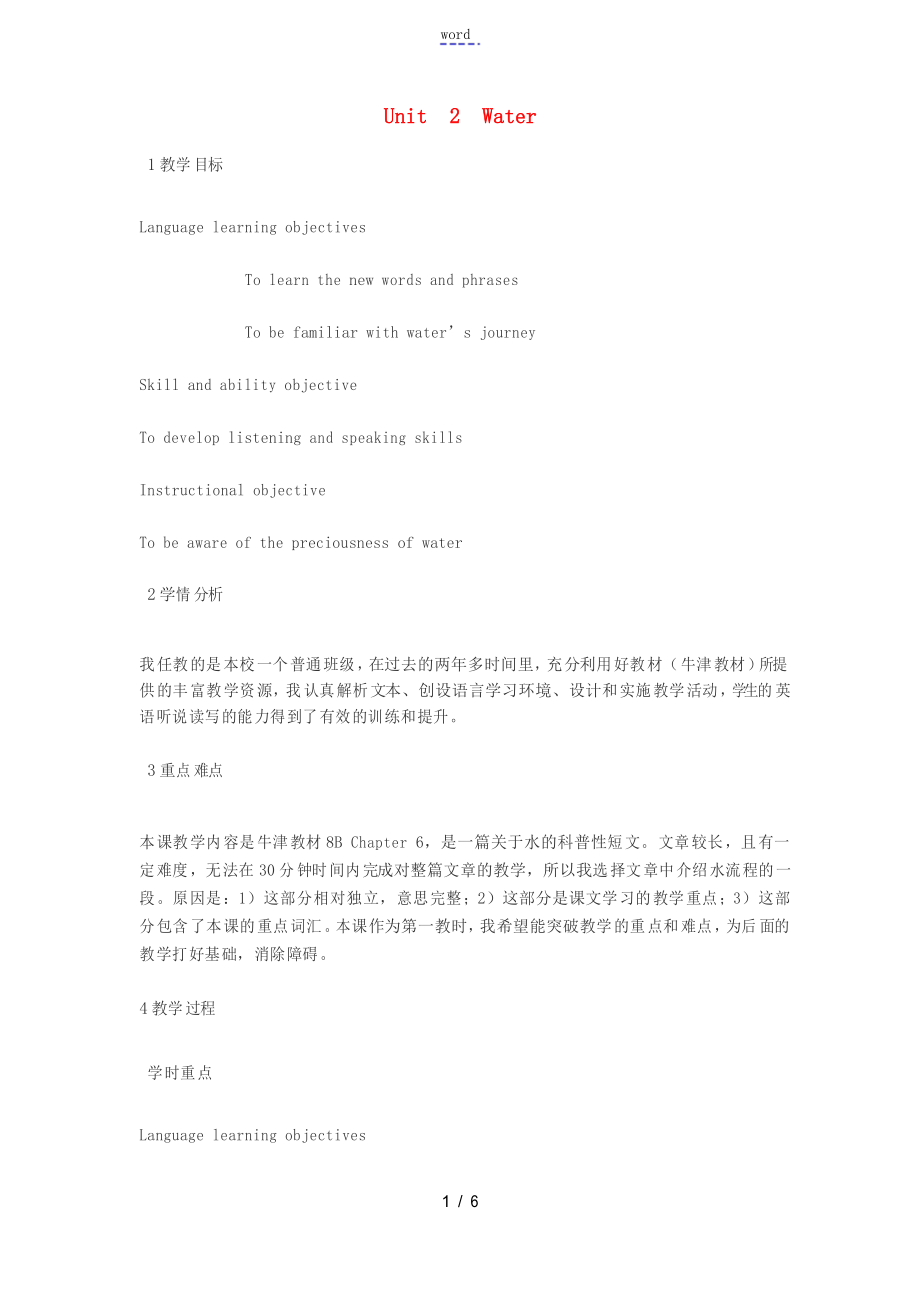《八年級(jí)英語下冊 Unit 2 Water教案 牛津上海版-牛津上海版初中八年級(jí)下冊英語教案》由會(huì)員分享,可在線閱讀�,更多相關(guān)《八年級(jí)英語下冊 Unit 2 Water教案 牛津上海版-牛津上海版初中八年級(jí)下冊英語教案(6頁珍藏版)》請?jiān)谘b配圖網(wǎng)上搜索。
1�、word
Unit 2 Water
1 教學(xué)目標(biāo)
Language learning objectives
To learn the new words and phrases
To be familiar with water’s journey
Skill and ability objective
To develop listening and speaking skills
Instructional objective
To be aware of the preciousness of water
2 學(xué)情分析
2、
我任教的是本校一個(gè)普通班級(jí)�,在過去的兩年多時(shí)間里,充分利用好教材(牛津教材)所提 供的豐富教學(xué)資源�����,我認(rèn)真解析文本����、創(chuàng)設(shè)語言學(xué)習(xí)環(huán)境、設(shè)計(jì)和實(shí)施教學(xué)活動(dòng)����,學(xué)生的英 語聽說讀寫的能力得到了有效的訓(xùn)練和提升。
3 重點(diǎn)難點(diǎn)
本課教學(xué)內(nèi)容是牛津教材 8B Chapter 6��,是一篇關(guān)于水的科普性短文�����。文章較長���,且有一 定難度�����,無法在 30 分鐘時(shí)間內(nèi)完成對整篇文章的教學(xué)��,所以我選擇文章中介紹水流程的一 段����。原因是:1)這部分相對獨(dú)立,意思完整���;2)這部分是課文學(xué)習(xí)的教學(xué)重點(diǎn)���;3)這部 分包含了本課的重點(diǎn)詞匯。本課作為第一教時(shí)�����,我希望能突破教學(xué)的重點(diǎn)和難點(diǎn)�,為后面的 教學(xué)打好基礎(chǔ)�����,消除障
3、礙����。
4 教學(xué)過程
學(xué)時(shí)重點(diǎn)
Language learning objectives
1 / 6
word
To learn the new words and phrases
To be familiar with water’s journey
Skill and ability objective
To develop listening and speaking skills
Instructional objective
To be aware of the preciousness of water
4、學(xué)時(shí)難點(diǎn)
作為科普性文章���,單詞有一定難度�����,需要進(jìn)行圖片����,實(shí)物等引入幫助學(xué)生理解單詞
全文圍繞水的旅程展開�,對重要句型的運(yùn)用有較高要求,需要進(jìn)行鋪墊
教學(xué)活動(dòng)
活動(dòng) 1【導(dǎo)入】課文導(dǎo)入:
Do you want to know more about water? Do you want to talk with water? Can wat er talk? In today’s lesson water can really talk. I am a drop of water today. You can call me Miss water. Look at
5�、the title “Water Talk”
I will talk with you. It is a good chance for you to ask me some questions. Go ahead!
How do you e here?
Where can we see you?
通過問題--“What does the sound make you think of?”,導(dǎo)入主題�����,活躍氣氛�,同時(shí)檢 測學(xué)生已有知識(shí)���。
創(chuàng)設(shè)情景���,明確師生角色�。教師作為一滴水和學(xué)生展開對話����。啟發(fā)學(xué)生發(fā)問,激發(fā)學(xué)生的求 知欲望����,真正體現(xiàn)了學(xué)生的學(xué)習(xí)主體性。以解決問題為
6��、主線開展教學(xué)是這節(jié)課的主要特點(diǎn)����。
2 / 6
這節(jié)課的教學(xué)圍繞三個(gè)主要問題展開:1)Where are you (water)? 2)What do you(wate r) do there? 3)How do you (water) e here?
活動(dòng) 2【講授】單詞教授和鞏固
Learning the new words and phrases
Lead-in the new words and phrases
You will see me in the cloud, waterfall, pipes.
You can see me
7、 in the cloud. And I am floating fortably in the sky. Can you gue ss the Chinese float?
You can see me in the waterfall. What is waterfall? I am speeding down the moun tain into the river. That is waterfall. Speed here is a verb, means move quickl y. Speed –sped –sped.
You can see me in the pi
8�、pes. How do I e to your bathroom from the pipes?
People pump me into the bathroom. Pump can also be used as a verb. It means pus h by machine.
Practising the new words
Now you’ve learned new words, try to learn them by heart.
(a game-hot seat)
I need chairs. Which game will we play?
9、
Let’s play the game hot seat as usual! You can use body language.
float--- stay on top of a liquid or air.
speed --- move quickly
thorough --- plete
3 / 6
pump--- push by machine
A water treatment works---- a place where water can be cleaned before it is u sed.
活動(dòng) 3【講授】課
10�、文學(xué)習(xí)
Learning the text of the water’s journey
(1) Listening to the text and answering the questions
What’s the next question ?
How do you e here?
It is a difficult question. I had a long journey before I came to you. You ca n find the answer in your text.
Listening carefully about t
11�、he text, I have two questions for you.
How long is my journey?
-----24 days
What do you think of the journey? I have been to a lot of places, such as
(2) Reading the text
Let’s find the places in our text . Open your books. Page 75 . From…to…
First, read it together!
(3) Watchin
12���、g the flash
Then watch the flash!
After that we will try to plete the map. There is a map on page 77. It shows my journey.
4 / 6
plete the blanks. You can discuss with your partner.
活動(dòng) 4【講授】課文鞏固
4) Retelling the text group by group (petition)
Now you are familiar with the
13、journey. Let’s have a petition among groups. I ‘d like you to say out the journey step by step.
Let’s find out which group gets the most scores. Who’d like to be my assistan t? . Congratulations!
(5) Doing a quiz on water’s journey
Now have you got the answer to the question “How do you e h
14�、ere?”
We have answered this question. But I think you still have some questions about water. So let’s do a quiz on water’s journey. Now what you are going to do i s ,first, think of more questions , second, share your ideas with your group me mbers. Then I will leave you some time to raise your q
15�����、uestions. The questions a re mainly about the water’s journey.
I want to invite some students to e here to answer the questions form us. Who’d like to be the drops of water?
是以課文學(xué)習(xí)為重點(diǎn)��,希望通過扎實(shí)有效的訓(xùn)練���,真正體現(xiàn)學(xué)生學(xué)習(xí)的過程。課文教學(xué)主要 有以下幾個(gè)步驟:1)聽錄音回答問題���;2)讀課文糾正發(fā)音�;3)觀看 flash 短片�,加深對 課文的理解����;4)填寫地點(diǎn);5)動(dòng)詞配對練習(xí)�����;6)造句練習(xí)串聯(lián)過程�;
16�����、7)小組競賽復(fù)述水 的流程�。
活動(dòng) 5【活動(dòng)】拓展訓(xùn)練
Post-task activities:
Talking about water again
After such a long journey, I came to you at last. And we have talked a lot abou t water. Now what do you think of me ? What should you do to me?
5 / 6
Precious means very valuable. Water is very precious. I know you don’t like it, but you have to .
本節(jié)課的三個(gè)高潮分別是 1)猜詞競賽活動(dòng)����;2)水流程接龍競賽;3)有關(guān)水的 quiz 活動(dòng)�。 在競賽活動(dòng)中�,學(xué)習(xí)積極性得到了激發(fā)�����,所學(xué)語言知識(shí)得到了運(yùn)用����,語言能力得到了有效的 鍛煉�,潛能得到了激發(fā)。我在日常教學(xué)中一直堅(jiān)持使用類似的教學(xué)方法和策略,并取得較好 教學(xué)效果
6 / 6
 八年級(jí)英語下冊 Unit 2 Water教案 牛津上海版-牛津上海版初中八年級(jí)下冊英語教案
八年級(jí)英語下冊 Unit 2 Water教案 牛津上海版-牛津上海版初中八年級(jí)下冊英語教案

